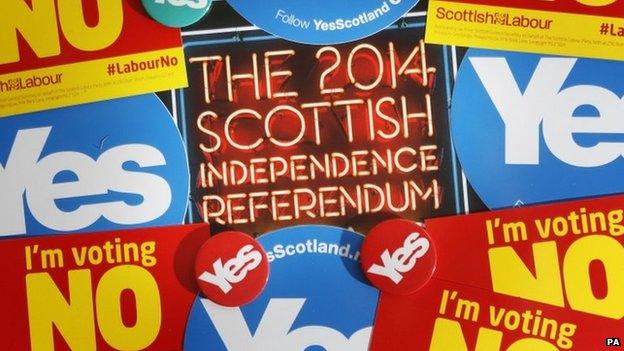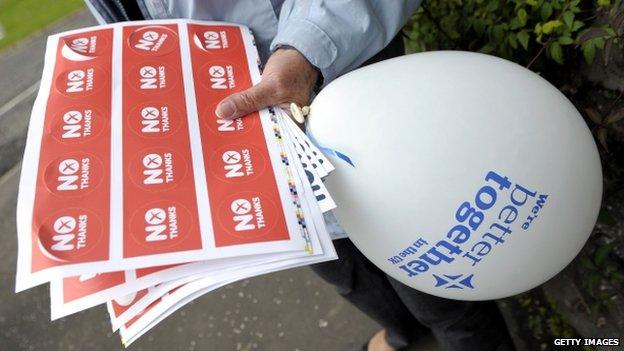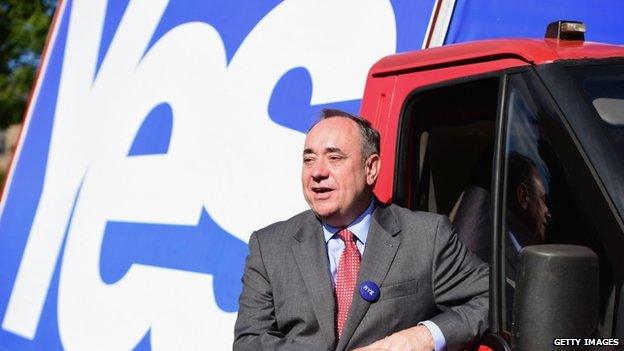Scottish independence: Referendum race 'may have got tighter'
- Published

What are the latest Scottish independence polls saying and could a huge turnout be a good thing for the "Yes" camp? Here John Curtice, who is professor of politics at Strathclyde University, sheds light on these questions.

For the past three or four months or so, the referendum race has looked as though it was stalled.
Although some pollsters consistently put the No side further ahead than did others, the running average of the last half dozen or so polls rarely departed very far from No 57%, Yes 43% (once the undecided were left aside).
With every poll putting it ahead, it looked as though the No side were on course for a clear if not necessarily overwhelming victory.
But now it looks as though the referendum race may have just got rather tighter.
Headlines to that effect certainly greeted a poll conducted by YouGov earlier this week.
"Victory in Reach for Salmond", declared The Times, while The Sun screamed that Mr Salmond was now within "splitting distance" of victory.
This particular YouGov poll put "Yes" on 47% (after Don't Knows are left to one side) and "No" on 53%.
In itself such a reading was not particularly spectacular; quite a few polls have put the Yes vote that high before now. But not polls from YouGov, who up to now had consistently been telling us that No were well ahead.


Indeed, just four weeks ago YouGov estimated that Yes were on just 39% and No on 61%. So their latest poll represented no less than an eight point swing in just four weeks.
We should of course never take too much notice of just one poll. Indeed the more spectacular a poll result, the greater the risk that it has been a victim of the error to which all polls are subject when they try to estimate how four million people will vote on the basis of the answers of just a thousand.
However, YouGov's poll came on the back of four other polls conducted in the second half of August that all suggested that the Yes vote had edged up a little. When a number of polls all begin to point in the same direction then it is time to sit up and take notice.
On average, the last half dozen polls have put Yes on 45% and No on 55%, a two point swing to Yes as compared with the predominant picture in recent months.

Exploring the polls

On 18 September 2014 millions of Scots will vote on whether they want their country to become independent or remain part of the United Kingdom. But what do opinion polls suggest about which way the decision will go? The BBC has tracked official polling over the last 12 months.

Such figures are not quite unprecedented (Yes and No were also briefly at that level towards the end of April), but they are certainly enough to lend credibility to the Yes side's claim that they have gained a new found momentum.
Even so, that still suggests that the Yes side still have to find another five points or so extra support from somewhere in the two last weeks of the campaign.
Many of its hopes seem to rest on gaining the support of the "missing million", that is those who did not grace their local polling station with their presence at the last Scottish Parliament election in 2011 (and may not have even been registered to vote), but who are expected to vote if, as anticipated, turnout is at least 75% on 18 September.
Fighting to the last
The Yes side reckon that many of these extra votes will be cast by less well-off and strongly disillusioned voters who are attracted by the prospect that independence might bring about radical change.
Here though the news is less welcome for the Yes side. For most polls suggest that those who did not vote in 2011 are less rather than more likely to vote for independence.
According to one analysis of recent polls, on average only 39% of those who did not vote in 2011 propose to vote Yes, while 61% say they will vote No. This Yes tally is markedly lower than the average overall level of support for Yes in those same polls, that is 45%.
Still thanks to the tightening of the overall referendum race there can be little doubt that both sides will redouble their efforts to win every last vote, wherever it may come from. After all, they may well need to.
Prof John Curtice is chief commentator at whatscotlandthinks.org, external, where a comprehensive collection of referendum polling results may be found.